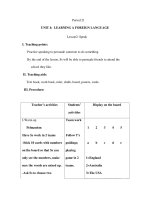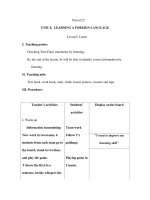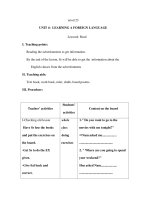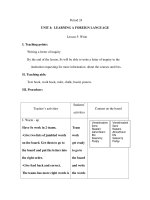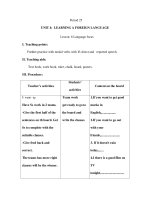UNIT 4 ETHICS facilities for
Bạn đang xem bản rút gọn của tài liệu. Xem và tải ngay bản đầy đủ của tài liệu tại đây (690.19 KB, 23 trang )
Unit 4
ethics
1. Avoiding paying tax
2. Claiming extra expenses
3. Using work facilities for private purposes (for example, personal phone calls)
4. Accepting praise for someone else’s ideas or work
5. Selling a defective product (for example, a second-hand car)
6. Using your influence to get jobs for relatives (nepotism)
7. Ringing in sick when you are not ill
8. Taking extended lunch breaks
9. Giving good references to people you want to get rid of
10. Employing people without the correct paperwork
Avoiding paying tax
Claiming extra expenses
Using work facilities for private
purposes (for example, personal
phone calls)
Accepting praise for someone else’s
ideas or work
Selling a defective product
Using your influence to get jobs
for relatives (nepotism)
Ringing in sick when you are not
ill
Taking extended lunch breaks
Giving good references to
people you want to get rid of
Employing people without the
correct paperwork
B. What examples can you give of
businesses behaving badly?
c. New words and phrases
Market capitalization/ Market cap
- refers to the total value of a publicly traded company's shares.
- is calculated by multiplying the total number of a company's outstanding shares
by the current market price of one share.
FTSE stands for Financial Times Stock Exchange.
FTSE 100 (Index)
- is the share index of the 100 companies listed on London Stock Exchange with the highest market
capitalization.
FTSE 250 (Index)
- is the share index of the 101st to the 350th largest companies listed on the London Stock Exchange.
FTSE 350 (Index)
- is the combination of FTSE 100 and FTSE 250;
- is the largest 350 companies by market capitalization .
S & P 500, or the Standard & Poor's 500 Index, is the share index of the 500 US
companies listed on the NYSE and NASDAQ with the highest market capitalization.
READING
I – Read the article and answer these questions.
1. What ethical issues do these industries face?
•
the food industry
Their products cause obesity.
•
mobile phone operators
They are challenged to protect teenagers from online pornography.
•
record companies
They sue music-lovers for sharing illegal files on the Internet.
1. What ethical issues do these industries face?
•
computer and telecommunications companies
They use factories in the developing world that have poor working conditions.
•
the financial sector
They lend to/give loans for socially or environmentally controversial projects in the developing world.
•
oil and mining groups
They don’t make public their payments to developing countries .
•
footwear and clothing brands
They should have increased the transparency of their supply chain and taken steps to improve often terrible labour standards.
2. Which areas of business do not give enough information about social and
environmental matters?
- hotels and leisure, and software and computer services
3. What examples are given of companies taking positive steps?
- There ‘s greater demand for the assistance from Business for Social Responsibility (BSR);
-
A group of leading banks, including Citigroup, Barclays and ABN Amro, promised to avoid giving loans for socially or
environmentally questionable projects;
-
Levi Strauss, Nike and published on the Internet the first independent audits of their supplier factories, along with the steps
taken to improve often terrible labour standards;
-
Kraft announced in July it would cut fat and sugar in its food, limit portion sizes and stop marketing in schools;
In the UK, the trend is also reflected in the sharp rise in social and environmental reporting over the past two years;
100 of the FTSE250, 40 of the 50 largest European companies and 22 of the S&P top 50 produce reports on environmental,
social and ethical issues.
attention
focused
college
ultilized
being
currently
counterparts
responsibility
threats
corruption
regulation
transparency
peer pressure
controversial
CRITICAL THINKING
What can (i) consumers, (ii) shareholders, (iii) employees do to try
to change the behavior of businesses that are behaving
unethically?




